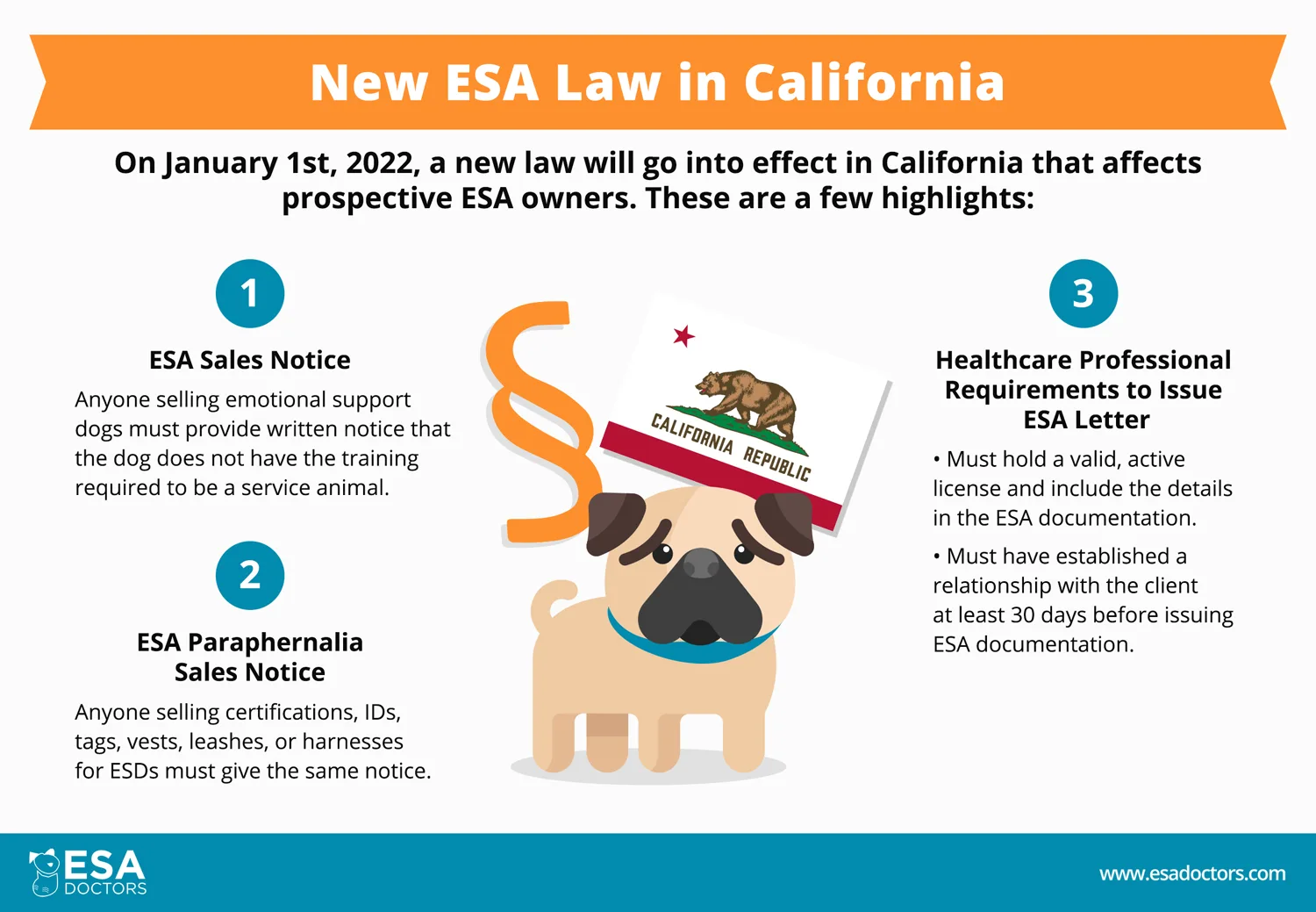Key Takeaways
Emotional Support Animals (ESAs) provide essential comfort and support for individuals with mental health challenges.
In California, an ESA letter from a licensed mental health professional is crucial to certify your animal as an ESA.
ESAs are protected under federal and state laws for housing but not in public places like service animals.
The process to obtain an ESA involves consultation, qualification, and registration.
Understanding the legal distinctions between ESAs and service animals is vital for navigating rights and responsibilities.
Why Emotional Support Animals Matter
Emotional Support Animals, or ESAs, play a crucial role in the lives of many individuals. They provide comfort, reduce anxiety, and can even help alleviate symptoms of depression. Unlike service animals, ESAs don’t require specific training to perform tasks. Their primary role is to offer emotional support through companionship.
“Emotional Support Animal Laws …” from esadoctors.com and used with no modifications.
Impact on Mental Health
Having an ESA can significantly impact one’s mental health. For those struggling with anxiety or depression, the presence of an animal can offer a sense of security and stability. Studies have shown that interacting with animals can lower stress levels, reduce blood pressure, and increase the release of serotonin and dopamine, which help improve mood.
For example, Sarah, a college student in California, found that her ESA, a gentle Golden Retriever named Max, helped her manage her anxiety during exams. Max’s calming presence allowed Sarah to focus better and feel more at ease in stressful situations.
Legal Definitions and Rights
Understanding the legal framework surrounding ESAs is crucial for both owners and the public. In California, emotional support animals are recognized under specific laws that protect their rights in housing. However, it’s important to note that ESAs are not granted the same public access rights as service animals.
The key legal protection for ESA owners in California is the Fair Housing Act, which requires landlords to make reasonable accommodations for individuals with ESAs. This means landlords cannot charge extra fees or deny housing based on the presence of an ESA, provided the owner has the proper documentation.
Understanding Emotional Support Animals in California
In California, the laws regarding emotional support animals are designed to ensure that individuals who genuinely need them can have their needs met without facing undue hardship. However, these laws also aim to prevent abuse of the system, ensuring that only those with legitimate needs can benefit from the protections offered.
Legal Rights in Housing and Travel
One of the most significant rights ESA owners have in California is related to housing. Under the Fair Housing Act, landlords must provide reasonable accommodations for individuals with ESAs. This means that if you have an ESA letter from a licensed mental health professional, your landlord cannot charge you additional fees or deny you housing because of your animal.
When it comes to travel, the Air Carrier Access Act used to allow ESAs to travel with their owners in the cabin of an aircraft without additional fees. However, recent changes mean that airlines are no longer required to accommodate ESAs. Therefore, it’s crucial to check with your airline in advance and be prepared to follow their specific policies regarding ESAs.
Differentiating Between Service Animals and Emotional Support Animals
It’s essential to distinguish between service animals and emotional support animals, as they have different legal rights and requirements. Service animals are trained to perform specific tasks for individuals with disabilities, such as guiding the blind or alerting someone with epilepsy to an impending seizure. Because of their training, they are allowed in public places where pets are typically not permitted.
On the other hand, emotional support animals do not require specialized training. Their primary role is to provide comfort and support through their presence. While they are granted certain housing rights under the Fair Housing Act, they do not have the same public access rights as service animals. This distinction is crucial for both ESA owners and the general public to understand, ensuring that the rights of all parties are respected.
Steps to Obtain an Emotional Support Animal in California
Getting an emotional support animal in California involves a few key steps. It’s not just about picking a pet and calling it an ESA. You need to follow specific procedures to ensure that your ESA is recognized legally, which will grant you the protections and rights you’re entitled to.
Initial Consultation with a Licensed Mental Health Professional
The first step in obtaining an emotional support animal in California is to have an initial consultation with a licensed mental health professional. This could be a psychologist, psychiatrist, or a licensed clinical social worker. During this consultation, you’ll discuss your mental health challenges and explore how an ESA might benefit your emotional well-being.
It’s important to be open and honest during this consultation. The professional will assess your needs and determine if an ESA is a suitable recommendation for your specific situation. Remember, this is not just about getting a pet; it’s about finding a supportive companion that can genuinely aid in your mental health journey.
Qualifying for an ESA Letter
Once your mental health professional determines that an emotional support animal is beneficial for you, the next step is to obtain an ESA letter. This letter serves as official documentation that you have a legitimate need for an emotional support animal.
The ESA letter should be on the professional’s official letterhead and include their license number, type, and date. It should also detail your need for an ESA and how it helps alleviate symptoms of your mental health condition. This document is crucial because it grants you the legal protections under the Fair Housing Act, allowing your ESA to live with you even in housing that typically prohibits pets.
Registering Your Emotional Support Animal
In California, there’s no official registry for emotional support animals, but having your ESA letter is crucial. Some owners choose to register their animals with online databases for added convenience, especially when dealing with landlords or airlines. However, remember that registration is not a legal requirement.
While you don’t need to register your ESA, it’s wise to keep all documentation readily available. This includes your ESA letter and any vaccination or health records for your animal. Being prepared with the right documentation can help you smoothly navigate any challenges that arise regarding housing or travel with your ESA.
Legal Protections and Responsibilities for ESA Owners
Owning an emotional support animal in California comes with specific legal protections, but it also entails responsibilities. Understanding both aspects is essential to ensure a harmonious relationship between you, your ESA, and the community.
First, let’s explore the legal protections you enjoy as an ESA owner. The Fair Housing Act is the primary federal law that safeguards your right to have an ESA in housing situations. California’s state laws align with these federal guidelines, ensuring that you cannot be discriminated against based on your need for an ESA.
Landlords must provide reasonable accommodations for ESAs.
No extra fees or deposits can be charged for having an ESA.
ESA owners must provide a valid ESA letter when requested.
Besides the protections, as an ESA owner, you have responsibilities to ensure your animal does not become a nuisance or danger to others. This includes keeping your ESA well-behaved and adhering to local animal control and leash laws.
Housing and Accommodation Laws
In California, housing laws protect ESA owners under the Fair Housing Act. This means landlords must accommodate ESAs even if their properties have a no-pet policy. However, owners must provide a legitimate ESA letter from a licensed mental health professional to prove their need for the animal.
It’s important to communicate openly with your landlord about your ESA and provide the necessary documentation upfront. This proactive approach can help prevent misunderstandings and ensure a smooth housing experience.
Travel Regulations with ESAs
Traveling with an ESA can be more challenging since recent changes in airline policies no longer require them to accommodate ESAs in the cabin. Therefore, it’s crucial to check the specific policies of the airline you plan to travel with and prepare accordingly.
Some airlines may allow ESAs to travel in the cabin for a fee, while others may require them to be transported as cargo. Always contact the airline well in advance of your travel date to confirm their requirements and ensure a hassle-free journey with your ESA.
Owner Responsibilities and Public Presence
Owning an ESA also means being responsible for your animal’s behavior in public. While ESAs are not granted the same public access rights as service animals, you might still bring your ESA to certain public places with permission. However, it’s crucial to ensure your ESA is well-behaved and does not disturb others.
Always adhere to local leash laws and ensure your ESA is properly vaccinated and healthy. Being a responsible ESA owner not only protects your rights but also ensures a positive experience for everyone involved.
Keep your ESA under control in public settings.
Adhere to all local animal control laws.
Ensure your ESA is vaccinated and in good health.
Maximizing the Benefits of an Emotional Support Animal
Having an ESA can significantly enhance your quality of life, but maximizing its benefits requires effort and dedication. Building a strong bond with your ESA is the first step. Spend quality time with your animal, engaging in activities that both of you enjoy.
Integrating your ESA into your daily life can also improve your emotional well-being. Whether it’s going for walks, playing fetch, or simply sitting together, these interactions can boost your mood and reduce stress.
Remember, the ultimate goal of having an ESA is to support your mental health. Regularly evaluate how your ESA is impacting your life and make adjustments as needed to ensure you’re receiving the full benefits of your companionship.
Building a Strong Bond with Your ESA
Building a strong bond with your Emotional Support Animal (ESA) is essential for maximizing the benefits of having such a companion. This bond is rooted in mutual trust and understanding, which can be developed through consistent and loving interactions. Spending quality time with your ESA helps strengthen this connection. Whether it’s through daily walks, playtime, or simply relaxing together, these moments are crucial for building a trusting relationship.
It’s important to be attentive to your ESA’s needs. Observing their behavior and responding to their cues can deepen your bond. For example, if your ESA seems restless, a walk or play session might help them relax. By being in tune with your ESA, you create a harmonious environment that benefits both you and your companion.
Integrating Your ESA into Daily Life
Integrating your ESA into your daily life can be a transformative experience. It involves more than just having them by your side; it’s about making them an active part of your routine. This integration can help create a sense of normalcy and stability, which is particularly beneficial for individuals dealing with anxiety or depression.
Start by involving your ESA in activities you both enjoy. This could be a morning jog, an evening cuddle, or even joining you during meditation sessions. These shared experiences can enhance your emotional well-being and reinforce the supportive role your ESA plays in your life.
Consider Sarah’s story, who found that incorporating her ESA, Max, into her yoga routine helped her feel more centered and less anxious. Max’s calm presence during her practice provided an additional layer of comfort and support.
Remember, the goal is to create a balanced routine where your ESA feels included and valued. This approach not only benefits your mental health but also strengthens the bond between you and your ESA.
Conclusion: Enhancing Mental Well-being with Emotional Support Animals
Emotional Support Animals are more than just pets; they are vital companions that contribute significantly to one’s mental well-being. By understanding the process of obtaining an ESA in California, from consulting with a licensed professional to integrating them into your daily life, you can fully leverage the benefits they offer. These animals provide comfort, companionship, and emotional support, helping to alleviate symptoms of anxiety, depression, and other mental health challenges.
As you embark on your journey with an ESA, remember to cherish and nurture the bond you share. This relationship is a two-way street, where both you and your ESA contribute to each other’s happiness and well-being. With the right approach, your ESA can be a powerful ally in your mental health journey.
Frequently Asked Questions (FAQ)
Many people have questions about Emotional Support Animals and the process of obtaining one in California. Here are some of the most common inquiries:
What is the process to qualify for an ESA in California?
To qualify for an ESA in California, you need to consult with a licensed mental health professional who can assess your mental health needs. If they determine that an ESA would be beneficial, they will provide you with an ESA letter. This letter is essential for accessing the legal protections afforded to ESA owners, such as housing accommodations under the Fair Housing Act.
It’s important to keep this letter updated and to have it readily available when requested by landlords or other entities. While there is no official registry for ESAs, maintaining proper documentation ensures that you can exercise your rights without hassle.
Do emotional support animals require special training?
Unlike service animals, emotional support animals do not require special training. Their primary role is to provide emotional support through their presence and companionship. However, it’s crucial that your ESA is well-behaved and does not pose a nuisance or danger to others. For more information on how to get an ESA, check out ESA Doctors.
While training is not a requirement, it can be beneficial to teach your ESA basic obedience commands to ensure they are manageable in various settings. This can enhance your experience with your ESA and ensure a positive interaction with others. For more information on how to get an ESA, check out this guide on emotional support animals in California.
For example, teaching your ESA to sit, stay, or come when called can make outings more enjoyable and stress-free for both you and your companion.
Overall, while special training isn’t necessary, a well-behaved ESA is crucial for maximizing the benefits of your companionship.
What rights do ESA owners have in California?
ESA owners in California have specific rights under the Fair Housing Act. This includes the right to have their ESA live with them in housing that typically prohibits pets, without being charged additional fees. However, these rights are contingent on having a valid ESA letter from a licensed mental health professional.
It’s important to note that ESAs do not have the same public access rights as service animals. This means they are not automatically allowed in public places such as restaurants or stores. Understanding these distinctions ensures that you can effectively navigate your rights and responsibilities as an ESA owner.
For those living in California, understanding the process of obtaining an emotional support animal (ESA) can be crucial. It’s important to know the specific requirements and legalities involved. If you’re wondering how to get an ESA letter in California, there are resources available to guide you through the necessary steps and ensure compliance with state regulations.






